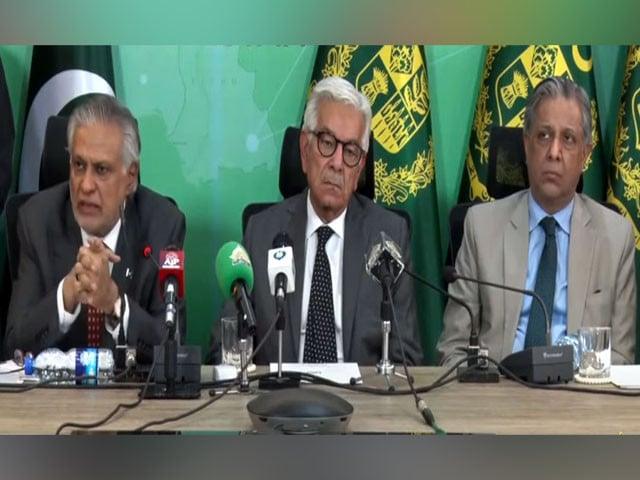Deputy Prime Minister and Foreign Minister Ishaq Dar warned on Thursday that Islamabad could withdraw from the Simla Agreement and other bilateral treaties if India unilaterally recalls the Indus Waters Treaty, in the midst of escalating diplomatic tensions.
At a joint press conference with senior booth members, he said, “If India finishes the Indus Waters Treaty, Pakistan will consider scraping the Simla Agreement and other appointments. We do not need external help responding to aggression, India will get a suitable answer.”
Dar rejected Indian accusations of cross -border terrorism as “baseless guilt play” and called on India to present evidence if it has any.
He said Pakistan has identified the arrival of “foreign nationals” in Srinagar, who is under monitoring of intelligence agencies. He claimed that Indian intelligence supported these individuals who reportedly tried to smuggle improvised explosion devices (IEDs).
“You can imagine their intended destination,” Dar noted, stressing that Pakistan’s armed forces are fully prepared to counter any threat.
He also confirmed the immediate closure of the Wagah border and announced that the Indian High Commissioners in Islamabad will be reduced to April 30. In addition, India’s defense, air and navy obligation has been declared Persona Non Grata and ordered to leave Pakistan.
Dar, who cited former US President Bill Clinton’s reference to Indian terrorism, highlighted India’s history of regional aggression. He also canceled his upcoming visits to Bangladesh and Kabul to tackle the unfolding situation.
“India can’t stop the water for 240 million Pakistanis,” Dar said. “If it tries to do it, it will be treated like an act of war.” He added that Pakistan is prepared for any scenario and would notify the World Bank, a guarantor of the Indus Waters Treaty, of the actions of India.
In the case of border tension, DAR warned against interpreting minor violations as a safety error considering the 2,000 -kilometer stretch. He repeated Pakistan’s obligation to prevent the use of its territory for cross -border operations.
“If India attacks, we will react kindly,” Dar said, adding that while Pakistan is ready to consult his allies, it doesn’t need any external help to defend. “If someone tries an adventure, the consequences may be worse than before.”
He noted that India’s formal demarche for the Pakistani envoy did not mention the suspension of the Indus Waters Treaty, despite the Indian Cabinet Statements that suggested otherwise. “It seems that there may be an interruption between the Indian government and its Foreign Ministry,” noted Dar.
Press the briefing followed a meeting of Pakistan’s National Security Committee (NSC), in which civil and military leadership approved a series of countermeasures to what it described as India’s “aggressive enidiaism.”
As part of the measures, Pakistan announced the closure of its airspace to Indian commercial flights and ordered the deportation of Indian defense, air and marine bones. The Indian High Commission in Islamabad will have its staff reduced to 30 members with effect from April 30.
Pakistan has also closed the Wagah border and issued 48-hour departure messages to Indian nationals in the country, with the exception of Sikh-Pilgrims whose journey remains unaffected.
Meanwhile, Defense Minister Khawaja Asif accused that India has repeatedly performed ‘false flag operations’ of justifying accusations against Pakistan, mentioning the recent incident in Pahaldam as another example.
“Despite the Indian media’s attempts to imply Pakistan, the Indian government has not officially named us in connection with the Pahagam attack,” Asif said during a joint press conference with senior officials on Thursday.
By taking a strike against Indian Prime Minister Narendra Modi, Asif said: “To date, no US administration has ever prevented a prime minister from entry by feeling him a terrorist. Modi is a certified terrorist who monitored the massacre of Muslims in Gujarat while serving as Chief Minister.”
The Minister of Defense also questioned how such an attack could occur under the guard of Indian security forces in heavily militarized Kashmir. “The incident raises serious questions about the effectiveness of Indian forces,” he said.
He pulled a parallel with the Pulwama incident in 2019 and suggested it was also staged. “India has a history of orchestrating attacks to change the blame on Pakistan,” he said, adding, “despite our political differences at home, the nation is united against Indian aggression.”
Minister of Information Attaullah Tarar criticized India’s rhetoric as a “young attitude” and warned that the ban on air would have financial influence on Indian Airlines. “This is more than talk we have taken action,” Tarar said.
An official from Pakistan’s Indus Waters Treaty Commission noted that the treaty cannot be suspended one -sided. “Even during two wars, the treaty lasted. It remains in force unless both nations jointly dissolve it,” the official said.
Pakistan has informed the World Bank, which is a guarantor of the treaty, and is considering further diplomatic paths if India continues with the suspension.



